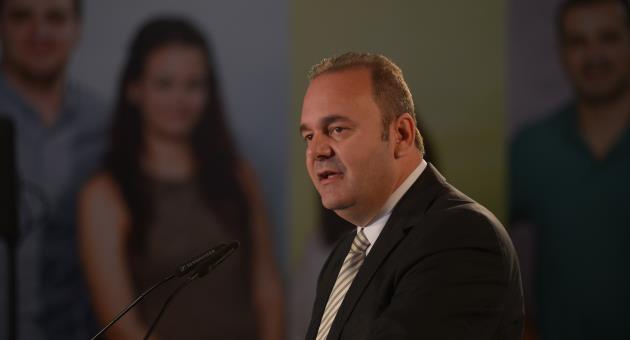In Malta, where everything is upside down and topsy-turvy, this guide is designed as a brief induction into the operational methods of the smallest State in the EU. The ideal dummy is visualised as a foreigner, an outsider, a barrani, a person of European origin who’s been instilled with European values since birth. Our weekly articles are aimed at helping you to (somehow) get ‘Malta’.
As in other European democracies, various government ministers assume different roles and responsibilities. In last week’s instalment, we focused on Owen Bonnici, the Minister for Justice and Culture who is a threat to both.
This week, we introduce Economy Minister Chris Cardona to see how he far he ‘measures up to the job’ (this distasteful double entendre will become clear).
In a statement made a few days after the assassination of journalist Daphne Caruana Galizia, Cardona said, “Our job is to empower the business community”.
Exactly who this ‘business community’ is and the precise nature of this ‘empowerment’ was cast into question in terms of what follows.
In January 2017, only months before her untimely murder, Caruana Galizia reported that the Economy Minister had been seen in a brothel in Germany along with his aide, Joe Gerada, while on official government business.
Soon after, both men not only filed libel suits against her but made the unprecedented move of imposing a garnishee order, freezing her financial assets to the tune of €47,460. As Caruana Galizia observed when she received this news:
“It should be clear to anyone that the Minister for the Economy and his EU presidency policy officer have not filed precautionary warrants on my assets because they are confident that they will win their cases (rather the opposite), obtain the maximum damages, and that I will not have the resources to pay them, but because they wish to harass me for what I have reported about them, obtain revenge, punish me and – beyond that – also silence others who have picked up the story. The idea is to create what the European Court of Human Rights, in its judgements on freedom of the press matters, calls a ‘chilling effect'”.
This ‘chilling effect’ reached its horrific extreme when, eight months later, she was silenced by a massive car bomb while driving to the bank in an effort to access her blocked bank accounts.
After her brutal murder, the libel case continued along with so many others filed by politicians, including the Prime Minister and Silvio Debono who, against fierce public resistance, has just been given permission to build a massive commercial tower block on after he was given public land at St George’s Bay.
In the case involving Cardona, his aide followed suit his master’s footsteps and dropped the case last week. As a result, phone records showing the whereabouts of these two Politically Exposed Persons (PEPs) while on political business were prevented from being made public.
It later emerged that Cardona had been seen drinking in a bar with one of the accused, and reports later also put him at a bachelor’s party with the same individual. Just as he refuted allegations he had been in a brothel, so too Cardona denied any association with the suspected assassin and, presumably on the basis of his word and his position as Economy Minister, was spared from having to undergo any form of police interrogation.
Unfortunately for the Economy Minister, recent investigations showed he had been economical with the truth. On Monday, La Repubblica reported that on 29 June 2017, four months before the assassination, Cardona attended a bachelor’s party where he met Alfred Degiorgio, the lead assassin in the murder trial.
Phone records are again paramount in terms of linking the Economy Minister with criminality. Unnamed by La Repubblica, Pierre Darmanin, previously investigated for fuel smuggling, phoned Caruana Galizia in October 2016, before calling Cardona then Degiorgio.
Just as the ‘brothelgate’ records have been detained at His Government’s Pleasure, so, too, the government withheld these call logs from the murder inquiry, despite the magistrate’s written requests for them.
Amid incriminating phone calls and bachelor parties, you would be forgiven for anticipating news of the Minister’s resignation alongside criminal proceedings. Instead, and in that now familiar way of making unsubstantiated claims, Cardona released a statement maintaining that ‘these smears are highly damaging and false.’
During a Parliamentary debate, and in a desperate fit of whataboutism, he asserted that ‘everybody knew that people who were lawyers or politicians, or indeed, lawyers and politicians, were invited to events where many other people were present, some of whom may not be of good character.’
The Economy Minister was previously a criminal lawyer and represented Vincent Muscat, another of the suspects in the Caruana Galizia murder trial. The particular business community he’s empowering needs to be called into question as, of course, does he.












